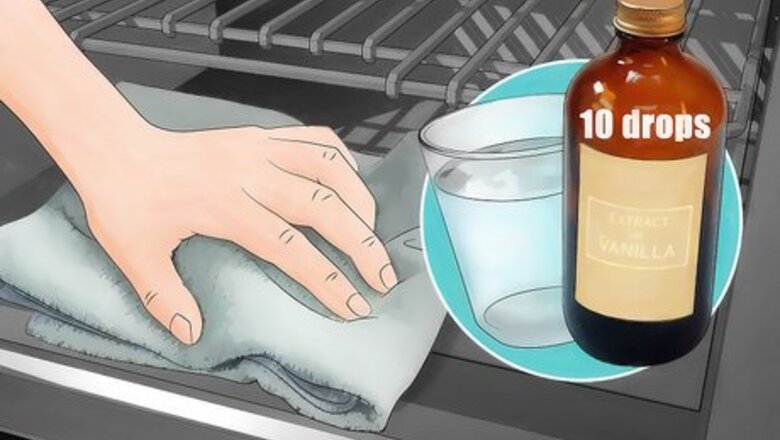
views
Getting Rid of Oven Cleaner Smell
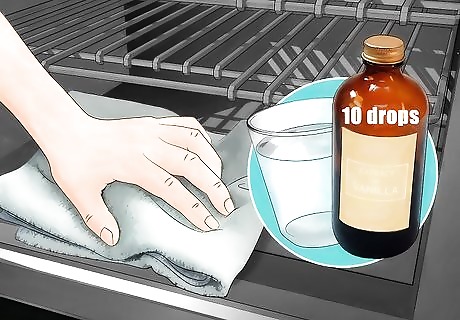
Wipe the oven down with vanilla. On top of smelling like grandma’s house and the holidays, the smell of vanilla can also act as a great mask for other odors. After you’ve cleaned your oven, there are two ways you can use vanilla to make it smell more pleasant: Fill a small bowl with water and add one teaspoon (six ml) of vanilla extract or 10 drops of vanilla essential oil. Dip a cloth into the bowl and wring out the excess water. With the damp cloth, wipe down the insides of the oven, including the walls, bottom, roof, and the racks. Dip the cloth into the water often, and go over the entire oven a few times to spread the vanilla smell. Instead of wiping the oven down with vanilla, you can also bake the vanilla to get the smell into the appliance. Preheat the oven to 250 F (121 C). Fill a small baking dish with an inch (2.5 cm) of water and add in one teaspoon (six ml) of vanilla extract. Place the bowl in the oven and let it heat up for about an hour. Check on it every 15 minutes or so, and add more water as needed if there's a lot of evaporation going on.
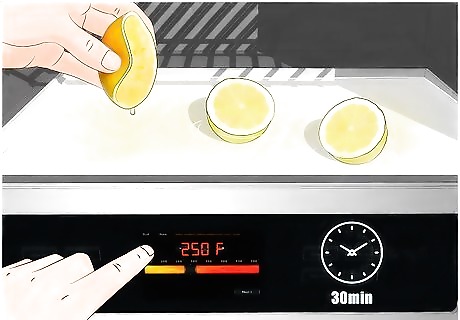
Freshen it up with lemons. Lemons are another miracle odor killer, and they’ll leave your kitchen smelling summer fresh and yummy. Not only that, but citrus itself is a great cleaner, so lemons will help loosen any leftover grease and buildup in your oven as well. Preheat the oven to 250 F (121 C). Cut two lemons in half and squeeze most of the juice into a baking dish. Add an inch (2.5 cm) of water, and place the lemon halves into the dish as well. When the oven is hot, place the dish on the rack and allow it to heat up for 30 minutes to an hour.
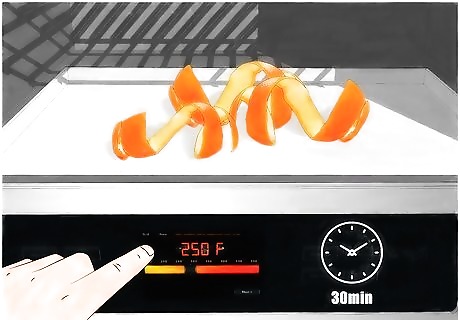
Bake fresh oranges. Another similar method to remove chemical and food smells from your oven is to bake oranges. The citrus in the orange has a similar cleaning power to lemons, and it will also make your house smell fresh and clean. Preheat your oven to 250 F (121 C). Peel an orange with your fingers or a knife and set the flesh aside for eating or juicing. Place the peels on a baking sheet and bake them for 30 minutes to an hour. After an hour, turn off the oven and open the oven door slightly to allow the citrus smell to escape. You can use any citrus for this, or a combination, such as lemons, limes, and grapefruits. If you don't have any citrus fruits, you can also pour 1 cup (240 mL) of white vinegar into an oven-safe bowl and put it in the oven for 20 minutes at the lowest temperature setting to get rid of the oven cleaner smell.
Cleaning an Oven Without Oven Cleaner
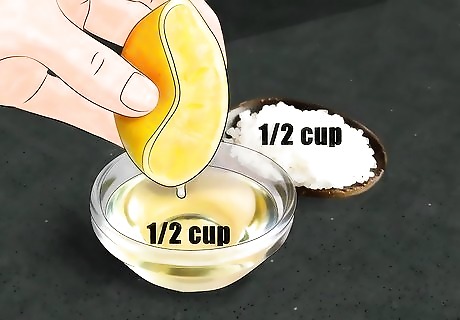
Make a DIY cleaning paste. You don’t need a strong commercial cleaner to clean your oven, and can actually make your own cleaning paste with stuff found in the kitchen and bathroom. There are several cleaning products you can make, including: A mixture of course salt and lemon juice. Mix a half cup (146 g) of course salt with a half cup (120 ml) of lemon juice. A simple baking soda paste. To make this, combine one-half cup (110 g) baking soda with enough water to make a paste. A baking soda soap mix. You can make this by combining a cup of baking soda (220 g) with a half cup (146 g) of coarse salt, plus one-quarter cup (60 ml) castile soap.
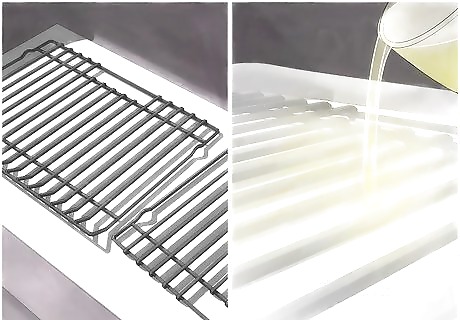
Remove and clean the racks. To clean the racks, place a large towel down in a bathtub and place the racks on the towel (the towel will protect the tub from scratches). Cover them with hot or boiling water, then add in some of your homemade cleaner or dish detergent. Allow the racks to soak for a couple hours before scrubbing them with a non-abrasive scrubbing pad to remove grease and food. When the racks are clean, empty the tub and rinse them with clean water. Replace the towel in the tub with a dry one, then stand the racks up on the towel to dry.
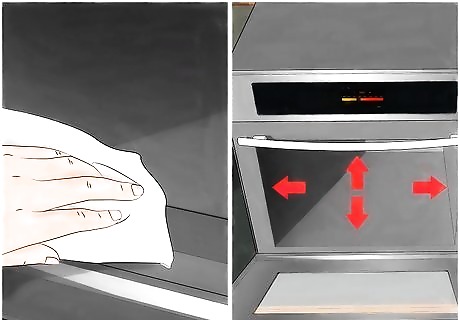
Spread the paste all over the oven. Use your hand or a clean cloth to coat the inside of the oven with your cleaning paste. Rub it in as you work, and make sure you get the entire surface area coated.
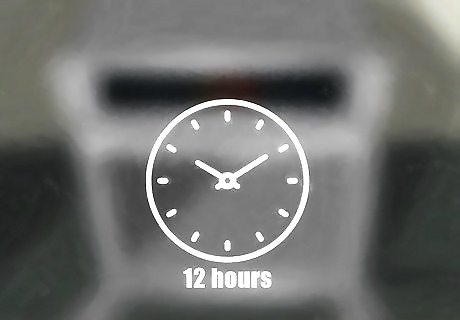
Let the paste sit. In order to break up grease and baked-on food, allow the paste to sit in the oven overnight, or for 12 hours if possible. If you don’t have that long to wait, let the paste sit for as long as possible before scrubbing.
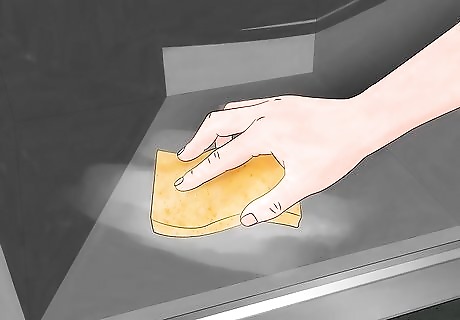
Scrub the oven. After the paste has had time to soak in, take a sponge with a non-abrasive scrubber attached and get it wet with warm water. If you don’t have this type of sponge, use a cloth and a separate scrubber. Wring out the excess water so the sponge is damp. Go over the interior of the oven with the sponge, scrubbing the areas that need extra work, and wiping off the paste as you go. Rinse out the sponge often with clean water. Once you’ve wiped out the oven, spray it with white vinegar to activate any leftover baking soda or to get extra residue off, then wipe it down again with the sponge and clean water.
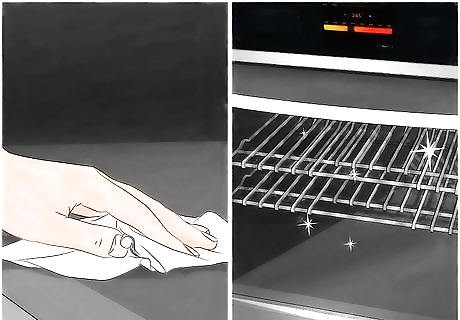
Wipe the oven and replace the racks. When all the paste residue, grease, and vinegar are gone, wipe the oven out with a clean, dry towel. Replace the racks and leave the door open to allow any excess moisture to dry.

















Comments
0 comment